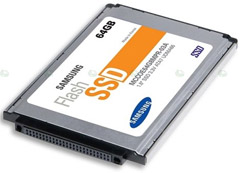SSDs are still ... far away
Although the advantages of solid-state storage (SSD) are undeniable, this technology is difficult to reach the mass market before 2013.
Compared to conventional Flash memory chips, SSDs promise a much larger storage capacity, equivalent to traditional hard drives.
However, if the hard drive will lose the processing data in the event of a sudden power outage, the SSD will be able to store exactly the same as the Flash chip.
Interestingly, but Jim Handy, an analyst with Objective Analysis, believes that SSDs are difficult to appear widely in laptops for at least 3-5 years.
" I'm still skeptical about the rapid popularity of SSDs, " he said.
" Flash memory chips have successfully replaced traditional hard drives (HDDs) in some fixed devices, but notebook users and PCs will continue to use HDD for a while longer ."
The first commercial SSD was equipped for laptops from last year. However, it also makes the cost of the product is quite high, up to several hundred dollars. Therefore, companies like Apple and Dell only dare to risk some high-end models.
Too expensive!
 Source: Ubergizmo " SSD is about 20 times more expensive than HDD with the same capacity. This is a difference that users can hardly accept, and also a barrier to prevent this technology from becoming popular in Short time ", Handy commented.
Source: Ubergizmo " SSD is about 20 times more expensive than HDD with the same capacity. This is a difference that users can hardly accept, and also a barrier to prevent this technology from becoming popular in Short time ", Handy commented.
According to him, as long as SSD production costs have not fallen to "reasonable" ground, this technology is still far away and impractical.
Even so, SSD manufacturers like Samsung have their own arguments. " SSD prices are expensive, but not only more durable, less damaged, SSDs also consume less power and run faster than HDD significantly ."
These are the worth of the new generation storage technology, when the boot time and data load are shortened, the battery life is extended.
For its part, Handy maintains that SSD performance is not higher than HDD. " With the money you spend, you have the right to ask for more ."
At least one computer maker supported Handy's point of view. Last month, HP's leader, the world's largest personal computer maker, predicts that SSD will " not have enough storage capacity and is not cheap enough to appeal to mass users, at least until 2010." ".